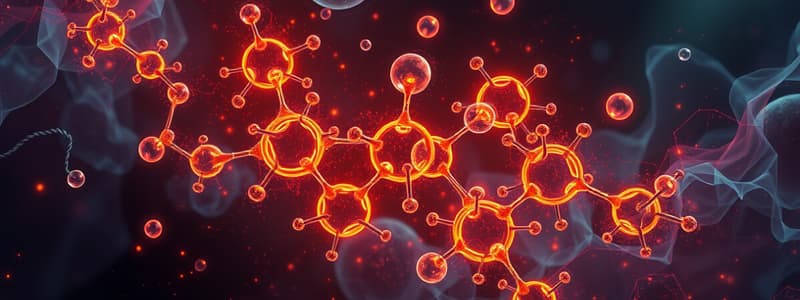Podcast
Questions and Answers
Which type of aromaticity is exhibited by a ring with a carbanion located outside the ring?
Which type of aromaticity is exhibited by a ring with a carbanion located outside the ring?
- Anti-aromatic
- Aromatic (correct)
- Para-aromatic
- Non-aromatic
How many pi electrons are required for a ring to be classified as aromatic according to the 4n + 2 rule?
How many pi electrons are required for a ring to be classified as aromatic according to the 4n + 2 rule?
- 10
- 8
- 4
- 6 (correct)
What is the aromaticity status of a ring with a carbanion possessing 8 pi electrons?
What is the aromaticity status of a ring with a carbanion possessing 8 pi electrons?
- Non-aromatic
- Para-aromatic
- Aromatic
- Anti-aromatic (correct)
Which statement about planar rings is true in relation to aromaticity?
Which statement about planar rings is true in relation to aromaticity?
What is the aromaticity of 14 annulene, which is confirmed as planar?
What is the aromaticity of 14 annulene, which is confirmed as planar?
What must the hybridization of all atoms in an aromatic compound's ring be?
What must the hybridization of all atoms in an aromatic compound's ring be?
Which of the following statements about Hückel's Rule is true?
Which of the following statements about Hückel's Rule is true?
What is the maximum count of pi electrons for a compound with n = 2 in Hückel's Rule?
What is the maximum count of pi electrons for a compound with n = 2 in Hückel's Rule?
How do double bonds and triple bonds contribute to the count of pi electrons in aromatic compounds?
How do double bonds and triple bonds contribute to the count of pi electrons in aromatic compounds?
Which of the following is true regarding heterocyclic rings?
Which of the following is true regarding heterocyclic rings?
When counting lone pairs in heteroatoms for aromaticity, which condition applies?
When counting lone pairs in heteroatoms for aromaticity, which condition applies?
What condition must be satisfied for a compound to be classified as anti-aromatic?
What condition must be satisfied for a compound to be classified as anti-aromatic?
In the context of phosphorus in aromatic rings, what happens to its lone pair when it forms a double bond?
In the context of phosphorus in aromatic rings, what happens to its lone pair when it forms a double bond?
Flashcards are hidden until you start studying
Study Notes
Aromaticity Criteria
- Cyclic or Polycyclic: Compounds must form a ring structure.
- Hybridization: Atoms in the ring should be sp2 or sp hybridized for aromaticity.
- Hückel's Rule: The pi electron count must follow the formula 4n + 2, where n is an integer (0 included).
- Planarity: All atoms in the ring must be in the same plane to achieve aromaticity.
Hückel's Rule
- Pi Electron Count: Applies the formula 4n + 2 for determining the number of pi electrons.
- Count Examples:
- n=0 yields 2 pi electrons
- n=1 yields 6 pi electrons
- n=2 yields 10 pi electrons
- n=3 yields 14 pi electrons
Counting Pi Electrons
- Double Bonds: Count as 2 pi electrons.
- Triple Bonds: Count as 2 pi electrons for aromatic calculations, despite having 4 pi electrons.
- Carbocations: Count as 0 pi electrons due to the positive charge.
- Lone Pairs:
- Count as 2 pi electrons if not part of a double bond.
- Do not count if part of a double bond.
Heterocyclic Rings
- Definition: Rings containing non-carbon atoms (e.g., O, N, S, P).
- Rehybridization: Non-carbon atoms can rehybridize to sp2, contributing lone pairs to aromatic systems.
- Hybridization Changes:
- Oxygen: sp3 to sp2
- Nitrogen: sp3 to sp2
- Sulfur: sp3 to sp2
- Phosphorus: sp3 to sp2
Counting Lone Pairs in Heterocycles
- Lone pairs from heteroatoms that are not in double bonds count as 2 pi electrons.
- Lone pairs in heteroatoms involved in double bonds do not count.
Aromatic, Anti-Aromatic, and Non-Aromatic Compounds
- Aromatic Compounds: Meet all criteria for cyclicity, hybridization, Hückel's rule, and planarity.
- Anti-Aromatic Compounds: Meet cyclic and hybridization criteria but fail Hückel's rule.
- Non-Aromatic Compounds: Fail to meet any of the initial criteria.
Aromaticity of Rings with Phosphorus and Carbanions
- Phosphorus in Aromatic Rings: If phosphorus has a double bond, its lone pair is excluded from the pi electron count.
- Carbanions: Contribute 2 pi electrons to aromatic systems if part of a ring.
Aromaticity of Rings with Carbanions
- Inside Ring (8 electrons): Typically anti-aromatic.
- Inside Ring (4 electrons): Typically anti-aromatic.
- Outside Ring (6 electrons): Can be aromatic.
Planarity of Rings
- Rings must be planar for aromaticity, impacting the ability to count electrons based on geometry.
Examples of Planarity
- Octatetraene (8 annulene): Non-planar; non-aromatic.
- 10 Annulene: Non-planar; non-aromatic.
- 14 Annulene: Planar; aromatic.
- 18 Annulene: Planar; aromatic.
Studying That Suits You
Use AI to generate personalized quizzes and flashcards to suit your learning preferences.




